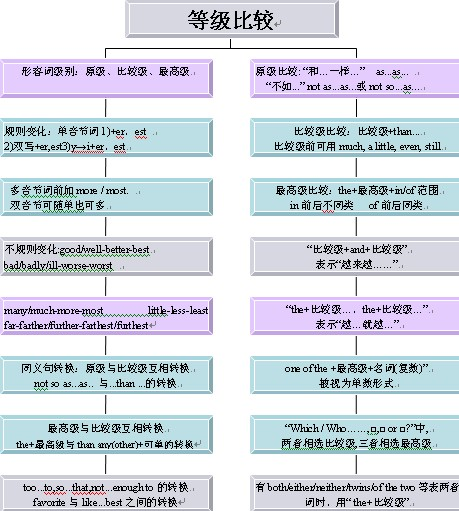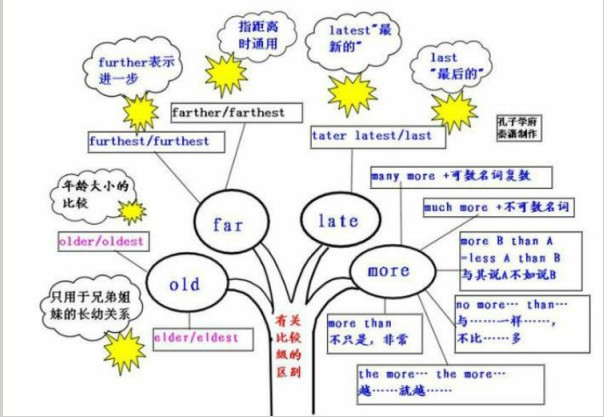本试题 “Extra lessons on Sundays put ______ pressure on students, who already have ______ homework.A. many; much ofB. more; many ofC. more;piles ofD. ma...” 主要考查您对量词
形容词的比较级
等考点的理解。关于这些考点您可以点击下面的选项卡查看详细档案。
- 量词
- 形容词的比较级
量词的概念:
通常用来表示人、事物或动作的数量单位的词,叫做量词。
例如:a bag of (rice), a piece of (news), a cup of (tea)
量词词组的特点:
特点一:
英语量词词组所表示的数或量:大致可归纳为四种类型,即定量、不定量、大量和少量。
1、表示定量的量词词组:
如:a couple of(两个、一对)—a couple of days,a couple o fplayers,a couple of times
a cupful of(一满杯)—a cupful of jelly,a cupful of water
a portion of(一份/客)—a portion of duck,a portion of roastbeef
2、表示不定量的量词词组:
如:a majority of(大多数/大半)—a majority of opinions,a majority of votes
an atom of(一点)—an atom of food,an atom of truth
a spell of(一阵/一段时间)—a spell of fine weather,a spell of coughing
3、表示大量的量词词组:
如:a flood of—a flood of ink(洋洋大篇),a flood of tears(泪如泉涌)
a heap of—a heap of earth(一堆泥土),a heap of customers(许多顾客)
a mountain of—a mountain of debts(债台高筑),a mountain of difficulties(困难重重)
4、表示少量的量词词组:
如:a drop of—a drop of fever(有点热度),a drop of dew(一点露水)
a particle of—a particle of feeling(一丝感情),a particle of dust(一点灰尘)
a shadow of—a shadow of doubt(一点怀疑),a shadow of freedom(一点自由)
特点二:
有些数量词组修饰可数名词,有些数量词组修饰不可数名词,还有些则两者均可修饰。
1、修饰不可数名词的量词词组:
如:a bit of—a bit of English(一点英语),a bit of good advice(一些好意见),
a bit of interest(一点兴趣), a shred of—a shredofevidence(一点证据)
a shred of cloth(少量布),a shred of reputation(一点声誉)
a sheet of—a sheet of glass(一块玻璃), a sheet of water(一片汪洋)
2、修饰可数名词的量词词组:
如:a cluster of—a cluster of flowers(一簇花),a cluster of spectators(一群观众),a cluster of bright stars(闪烁群星)
a string of—a string of pearls(一串珠子),a string of curses(连续不断的咒骂),a string of excuses(一连串借口)
a scram of—a scram of mosquitoes(一群蚊子),a scram of geese(一群鹅),a scram of children(一群孩子)
3、修饰(不)可数名词的量词词组:
如:a body of—a body of bees(一群蜜蜂),a body of coldair(一股冷空气),a body of facts(许多事实)
a block of—a block of ice(一大块冰),a block of flats(一幢公寓),a block of houses(一排房子)
a chain of—a chain of ideas(一系列想法),a chain of accidents(一连串事故),a chain of proof(一连串证据)
特点三:
有些数量词组的搭配是固定的,而有些搭配则比较灵活。
1、搭配固定的量词词组:
如:a barrel of—a barrel of beer(一桶啤酒),a barrel of crudeoil(一桶原油)
a basket of—a basket of eggs(一篮鸡蛋),a basket of apples(一篮苹果)
a line of—a line of trees(一行树),a line of poetry(一行诗)
2、搭配较灵活的量词词组:
如:a piece of—a piece of paper(一张纸),a piece of furniture(一件家具),a piece of equipment(一台设备)
a round of—a round of spirit(一巡酒),a round of diplomatic talks(一轮外交谈判),a round of toast(一片烤面包)
a bar of—a bar of chocolate(一块巧克力),a bar of soap(一条肥皂),a bar of light(一束光)
一些常见的量词及搭配:
1、一般性的表示个数的量词:
这一组中主要有piece, bit, item, article等词,但piece具有独特的地位,在使用其他词的地方一般都可使用piece代替之。
如:piece: a piece of meat/paper/bread/music/information/furniture/machinery, etc.一片肉/一张纸/一片面包/一首曲子/一条信息/一件家具/一台机器等
bit: a bit of news/wood/advice/trouble, etc. 一条消息/一块木头/一条建议/一件麻烦事等
item: an item of news/crime/program/business, etc. 一条新闻/一宗罪行/一个项目/一笔生意等
article: an article o fexport/furniture/clothing/luggage, etc. 一宗出口/一件家具/一件衣服/一件行李等
2、以形状表示个数的量词:
如:bar: a bar of chocolate/candy 一块巧克力/一块糖
bunch: a bunch of flowers/grapes/keys 一束花/一串葡萄/一串钥匙
cake: a cake of soap/ice 一块肥皂/一块冰
cluster: a cluster of stars/flowers/animals 一群星/一束花/一群动物
comb: a comb of bananas 一串香蕉
drop: a drop of rain/blood 一滴雨/一滴血
ear: an ear of corn/wheat 一棒玉米/一穗麦子
flight: a flight of stairs/arrows/sparrows 一段楼梯/一阵箭雨/一群麻雀
flock: a flock of workmen/criminals/boys 一群工人/一伙罪犯/一群男孩
head: a head of cabbage/cauliflower/sheep 一头卷心菜/一块花菜/一头羊
lump: a lump of sugar/coal/clay一块糖/一块煤/一块土
spiral: a spiral of mosquito incense 一盘蚊香
slice: a slice of meat/bread/beef 一片肉/一片面包/一块牛肉
swarm: a swarm of bees 一群蜜蜂
bevy: a bevy of beauties/girls/ladies 一群美人/一群女孩/一群女士
gathering: a gathering of friends 一帮朋友
clump: a clump of trees 一丛树林
pack: a pack of rascals/wolves 一群流氓/一群狼
3、表示容积的词:
如:bottle: a bottle of ink/milk/wine 一瓶酒/一瓶牛奶/一瓶葡萄酒
bowl: a bowl of rice/porridge 一碗米饭/一碗粥
pail: a pail of water 一桶水
glass: a glass of beer 一杯啤酒
cup: a cup of tea 一杯茶
handful: a handful of soil 一抔土
spoonful: a spoonful of oil 一汤匙油
mouthful: a mouthful of snow 一口雪
truckload: a truckload of steel 一卡车钢材
packet: a packet of cigarette 一包烟
4、表示行为动态的量词:
如:fit: a fit of laughter 一阵笑声
peal: a peal of thunder 一阵雷声
flash: a flash of light 一道闪电
display: a display of force 一番武力展示
还有:①a drove of horses(一群马)
②a flock of goats(一群山羊)
③a herd of elephants(一群大象)
④a pack of wolves(一群狼)
⑤a pride of lion(一群狮子)
⑥a skulk of foxes(一群狐狸)
形容词比较级概念:
大多数形容词(性质形容词)有比较级,用来表示两个人或事物之间的比较“较……”。
如:I am taller than you.
形容词比较级特殊用法:
1、没有比较对象的比较结构:
所谓没有比较对象的比较结构不是指省略而言,而是指并非真正的比较。
例如:The car runs faster than110 miles. 那辆车时速为110多英里。
There is more than one solution to the problem. 这个问题的解决办法不止一个。
The daily cost in an average hospital in the United States can run as high as $250. 在美国普通医院的每天的费用可高达250美元。
2、用比较级的形式表达最高级的意思:
在这种情况下,往往是将一个人或是一件事与其他所有的人或事相比较。注意别忘了常在比较状语中用any, other, else类的字眼,以将比较主体排除在比较对象以外,因为自己不可以与自己相比较。
例如:He is taller than any one else in our class. 他在我们班比其他任何都高。
Iron is more useful than any other metals. 铁比其他任何金属更有作用。
3、no+比较级+than的结构表示“A和B一样不……”:
例如:She runs no faster than her sister.她与她妹妹一样跑不快。
Tom is no wiser than John. 汤姆和约翰一样没有聪明才智。
He is no richer than his brother. 他与他弟弟一样不富有。
4、汉语可以说“昆明的气候比兰州好”。英语必须加that:
例如:The climate of Kunming is better than that of Lanzhou.
5、英语比较级常译作“较…”、“…一些”等,但不等于汉语的“更…”。汉语的“更…”须用“still”或“even”来表示:
如:This book is even more difficult than that one. 这本书比那本书更难。
6、有些情况下,汉语不用“较”等字眼,英语则须用比较级:
如:Will the younger people give their seats to old people? 请年轻人把座位让给老年人好不好?
形容词比较级的用法:
1、比较级用于二者的比较,其结构是:含有形容词比较级的主句+从属连词than引导的从句(从句中常省去意义上和主句相同的部分)。
如:Li is older than Zhou. 李比周年纪大。(从句中省去了is old)
There are more children in this nursey than in that one. 这个托儿所的孩子比那个托儿所多。(从句中省去了there are children)
After two years' physical training, she is healthier and stronger. 经过两年的体力锻炼,她(比以前)健康强壮多了。(注意这里省去了从句than she was)
We are much better off than ever before. 我们的生活比过去任何时候都要好得多。(than后省去了we were)
Paul weighs less than harry. 保尔的体重比哈利轻。
Mary is less clever than Jane. 玛丽不如简那么聪明。
2、可修饰比较级的词:
1)a bit, a little, rather, much, far, by far, many, a lot, lots, a great deal, any, still, even等
2)还可以用表示倍数的词或度量名词作修饰语。
3)以上词(除by far)外,必须置于比较级形容词或副词的前面。
典型例题:
1)—Are you feeling ____?
—Yes,I'm fine now.
A. any well
B. any better
C. quite good
D. quite better
答案:B. any可修饰比较级,quite修饰原级,well的比较级为better.
2)The experiment was____easier than we had expected.
A. more
B. muchmore
C. much
D. moremuch
答案:C. much可修饰比较级,因此B,C都说得通,但easier本身已是比较级,不需more,因此C为正确答案。
3)If there were no examinations, we should have___at school.
A. the happiest time
B. a more happier time
C. much happiest time
D. a much happier time
答案:D.
注:many, old和far用法:
1)如果后接名词时,much more+不可数名词 many more+可数名词复数
2)old有两种比较级和最高级形式:older/oldest和elder/eldest。elder,eldest只用于兄弟姐妹的长幼关系。
如:My elder brother is an engineer.
3)far有两种比较级,farther,further在英语中两者都可指距离。在美语中,father表示距离,further表示进一步。
如:I have nothing further to say.
3、比较级中的两个特殊作用的结构:
1)The+比较级+句子,表示的意义是“越(怎么样就)越(怎么样)”,在这个结构中的两个“比较级”不要求一定词性相同,它们各自的词性要依句子的需要而定;
2)和比较级+and+比较级。表示的意义是“越来越(怎么样)”,在这个结构中的两个“比较级”则要求词性相同。
例如:The harder you work at your study, the better academicrecords you will have. 你学习越努力,你的成绩就越好。
The more we have, the more we want. 人欲无穷。
When winter is coming, it gets colder and colder. 冬天来临之际,天越来越冷了。
He became less and less satisfied with the foot ball team's performance. 他对足球队的表现越来越不满意了。
形容词比较等级知识体系:

特殊形容词比较级变化:

与“Extra lessons on Sundays put ______ pressure on students,...”考查相似的试题有:
- Shortly after the accident, two___________ police were sent to the spot to keep order.A.dozens ofB.dozensC.dozen o...
- It is ____the ancient temple at the top of the mountain.A.worth to visitB.worthwhile visitC.worthwhile visitingD....
- The pianos in another shop will be________, but________.A.cheaper;not as betterB.more cheaper;not as betterC.ch...
- The manager is always very _______ for appointments, which earns him a good reputation.A.punctualB.numbC.allergicD...
- Today some people get ______ because they eat too much fat and sugar and don’t take enough ______.A.fatter and fatte...
- What he said sounds ____.A.nicelyB.pleasantlyC.friendlyD.reasonably
- In my view, London's not as expensive in price as Tokyo but Tokyo is _____ in traffic.A. the most organizedB. more or...
- We all think it was a________football match between Guoan and Shenhua and we were all________at it.A.disappointing;...
- 4. He is _____, but he doesn't feel _____. Because he likes to surf the Internet for his study of English.A.lonely; ...
- Though he was born and brought up in Australia, he can speak ______ Chinese.A.fluentB.smoothC.flowingD.floating